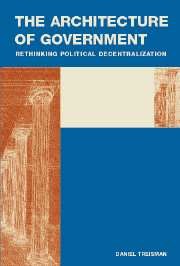Book contents
- Frontmatter
- Contents
- List of Figures and Tables
- Preface
- Glossary of Main Notation Used
- 1 INTRODUCTION
- 2 THE POLITICAL PROCESS
- 3 ADMINISTRATIVE EFFICIENCY
- 4 COMPETITION AMONG GOVERNMENTS
- 5 FISCAL POLICY AND REDISTRIBUTION
- 6 FISCAL COORDINATION AND INCENTIVES
- 7 CITIZENS AND GOVERNMENT
- 8 CHECKS, BALANCES, AND FREEDOM
- 9 ACQUIRING AND USING KNOWLEDGE
- 10 ETHNIC CONFLICT AND SECESSION
- 11 DATA TO THE RESCUE?
- 12 CONCLUSION: RETHINKING DECENTRALIZATION
- References
- Index
- Titles in the series
12 - CONCLUSION: RETHINKING DECENTRALIZATION
Published online by Cambridge University Press: 05 June 2012
- Frontmatter
- Contents
- List of Figures and Tables
- Preface
- Glossary of Main Notation Used
- 1 INTRODUCTION
- 2 THE POLITICAL PROCESS
- 3 ADMINISTRATIVE EFFICIENCY
- 4 COMPETITION AMONG GOVERNMENTS
- 5 FISCAL POLICY AND REDISTRIBUTION
- 6 FISCAL COORDINATION AND INCENTIVES
- 7 CITIZENS AND GOVERNMENT
- 8 CHECKS, BALANCES, AND FREEDOM
- 9 ACQUIRING AND USING KNOWLEDGE
- 10 ETHNIC CONFLICT AND SECESSION
- 11 DATA TO THE RESCUE?
- 12 CONCLUSION: RETHINKING DECENTRALIZATION
- References
- Index
- Titles in the series
Summary
The mania for drawing conclusions is one of humanity's most dreadful and sterile obsessions. Each religion, and each philosophy, has claimed to have God to itself, to comprehend the infinite and to know the recipe for happiness. What pride and what nothingness!
Gustave Flaubert (1863)So what can one say in general about the consequences of administrative and political decentralization? It is time to sum up.
Multi-tier institutions can, as Montesquieu argued, achieve the advantages of both large and small size. Administrative decentralization makes it possible for a benevolent and wise ruler to satisfy the demands of a heterogeneous population more precisely and cost-effectively. But multi-tier government can also achieve the disadvantages of both large and small size. Under less benign, intelligent, or effective leadership, the outcome may be greater waste, higher costs, and more citizen frustration.
If administrative decentralization can have opposite effects, what about political decentralization? Some claim that giving local communities the right to select their own rulers and decide matters of local concern themselves will improve the quality of government. I considered a series of arguments to this effect. Many of these could hold in particular cases, but none seemed likely to hold in general. Nor could I identify a set of observable conditions under which the positive effects would outweigh the negative.
Under political decentralization, different policies can be chosen in different places. But the same is true under centralization: Fully sovereign central governments differentiate their policies geographically all the time.
- Type
- Chapter
- Information
- The Architecture of GovernmentRethinking Political Decentralization, pp. 270 - 294Publisher: Cambridge University PressPrint publication year: 2007



